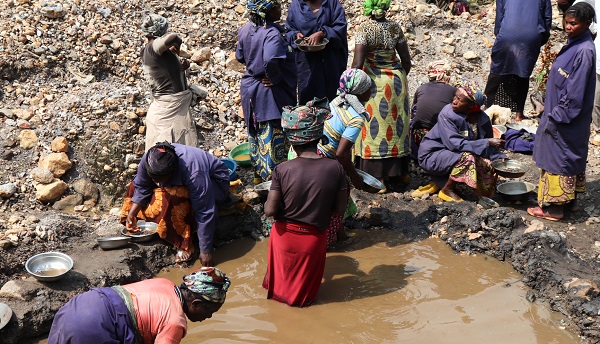 Credit: Commission luxembourgeoise "Justice et Paix"
Credit: Commission luxembourgeoise "Justice et Paix"
Two months before the entry into force of the European regulation on minerals from conflict zones, Fairtrade Lëtzebuerg has called for the advancement of national legislation and for awareness raising among Luxembourg players affected by this regulation; the NGO already launched a call for transparency in certain provisions in March 2020.
Many everyday products are made from tin, tantalum, tungsten or gold. However, behind these minerals hides a little-known reality: their extraction and trade are often linked to conflicts and human rights abuses, such as the slavery of miners, the exploitation of children, torture and rape, hence the name "blood minerals". The European regulation, signed in 2017, calls for mandatory due diligence checks for importers of these minerals from conflict-affected and high-risk areas. Fairtrade Lëtzebuerg described this regulation, which will enter into force on 1 January 2021, as an important first step towards building supply chains free from human rights violations. In preparation for its implementation at the national level, EU Member States are clarifying certain measures.
Some Member States have already legislated or are in the process of doing so, for example Germany, Austria and the Netherlands. According to the NGO, no bill has been tabled so far in Luxembourg's Chamber of Deputies (Parliament). In this context, Fairtrade Lëtzebuerg has called on the Luxembourg government to ensure that important elements are taken into account in national legislation concerning conflict minerals by adopting the necessary measures to ensure transparency, efficiency and the involvement of civil society.
The NGO outlined the following examples of important aspects to be considered:
- An annual publication of the complete list of national companies and importers subject to the European regulation. According to the organisation, the non-publication of this list would make it impossible for civil society actors, both in Europe and in producing countries, to follow the commitments of companies and raise justified concerns.This recommendation will be implemented in Austria, for example;
- The regular and annual control of economic players. This should not be limited only to technical aspects but should verify whether respect for human rights has been taken into account;
- The application of the verification criteria should clearly refer to the current guidelines of the OECD guide on minerals;
- The establishment of effective (administrative) fines in the event of non-publication of information obligations;
- The involvement of the various stakeholders, including civil society, in the reflection on the implementation of the regulation, as outlined in Luxembourg's National Action Plan for the implementation of the United Nations Guiding Principles on Business and Human Rights;
- The dissemination of information and support for companies affected by this legislation in order to facilitate the implementation of the regulation from January 2021. Fairtrade Lëtzebuerg noted that around 20 Luxembourg companies appear to be affected by this European regulation.
The NGO maintained that such measures would initiate a process that can break the vicious circle between the trade in minerals and human rights violations in the importation of tin, tungsten, tantalum and gold from areas of conflict or risk. In this context, the NGO added that the Luxembourg state must also ensure implementation in its public purchases.
Fairtrade Lëtzerbuerg concluded that the Luxembourg government, which is a candidate for a seat on the UN Human Rights Council, must therefore seize this opportunity to show leadership and take part in a constructive dialogue in order to convince EU Member States to make a firm commitment to more responsible and transparent supply chains and thus contribute to respect for human rights - an objective which can only be achieved through coherent political choices.








